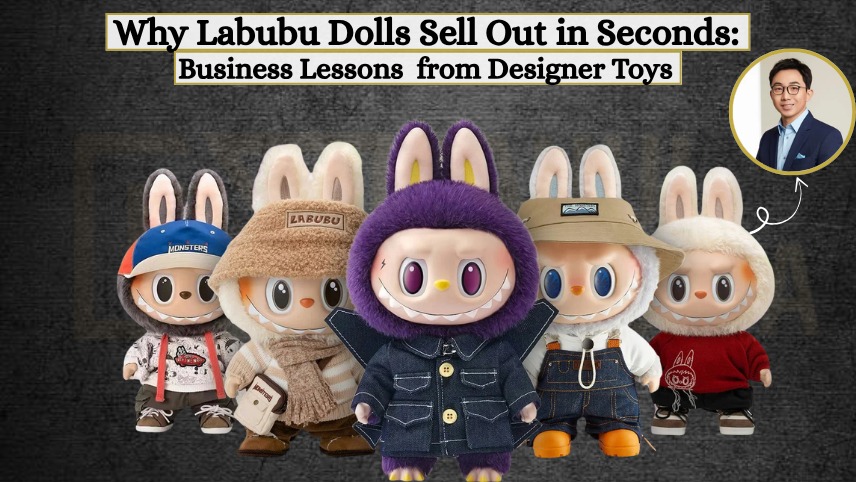
Why Labubu Dolls Sell Out in Seconds: Business Lessons from Designer Toys
You’ve probably seen them on Instagram. A tiny, wide-eyed creature with big ears, a mischievous smile, and a look that somehow feels both creepy and cute. They call it Labubu. And what might look like just another collectible toy has now become a global craze. But here's the catch: these dolls vanish within seconds of going on sale. People set alarms. Websites crash. Resellers flip them for 5X the price. And it leaves everyone asking one simple question: Why?
Let’s go behind the scenes of this phenomenon. Because if you look closely, Labubu dolls aren’t just toys. They are a business case study wrapped in vinyl. And for Indian entrepreneurs looking to learn the science behind going viral, selling out, and building obsession this is one story you don’t want to miss.
The Day Labubu Stole the Show
Somewhere in Hong Kong, a young adult is refreshing a website at 11:59 PM. In 60 seconds, a limited drop of Labubu designer toys will go live. She’s not a kid. She’s a 28-year-old finance professional. But this is her third attempt. Last time, it was gone in eight seconds. This time, she gets lucky.
What started as a niche art toy has now exploded into a movement. People don’t just buy Labubu dolls, they hunt them. They queue up for hours at pop-ups. They travel to exhibitions. Some even cry when they unbox one. The emotional connection is real. But so is the money.
In the aftermarket, Labubu dolls are being resold for ₹30,000 to ₹1,00,000, depending on how rare the piece is. That’s more than what many Indians spend on a high-end smartphone. Still think it’s just a toy?
The Business of Rarity
Here’s where things get really interesting. The company behind Labubu, POP MART, never floods the market. They don’t mass-produce. They release in waves. Small batches. Limited editions. Seasonal drops. No product lasts too long on the shelves. And that, right there, is their secret sauce.
Creating artificial scarcity is one of the oldest tricks in the book. But POP MART does it like a pro.When there’s less product available than people want, everyone wants it more. It creates anxiety. It creates urgency. And when people know there’s a good chance they might miss out they act fast. That’s exactly why Labubu dolls sell out in seconds.
This is what luxury brands have been doing for decades. But Labubu makes it feel fresh. It’s positioned as an emotional art collectible, not a status symbol. That’s what makes people connect with it, share it, and spread it fast.
Emotional Branding That Works
There’s something very important Indian business owners can learn here: emotional branding.
Labubu isn’t famous because it was pushed through big celebrity endorsements or massive ad budgets. In fact, it has none of that. What it has is a story. A design that sparks childhood nostalgia, with a twist of quirk. A character that feels alive, like it has feelings. Fans give it personalities. Some people go a step further and make comics or stories around it. It becomes personal.
This is branding at its most intimate. When your customers feel like your product is a part of their identity, you’re no longer just selling, you're bonding. Labubu dolls have nailed that connection. And that emotional pull is what makes people camp out at midnight, just to own a tiny figure that fits in the palm of their hand.
The Magic of Mystery Boxes
Here’s a twist that will blow your mind. Many of these toys are sold without revealing which one’s inside. You only find out what’s inside after opening the box. Sometimes, you get a common design. Sometimes, you strike gold and get a secret rare. That thrill, that suspense, that little hit of dopamine it’s like opening a lottery ticket.
Psychologically, it creates repeat buying behavior. You buy one. Then another. Then another. Who knows? There’s always a chance you’ll get the one you’re hoping for. And suddenly, you just want to get them all. That’s a business strategy that turns a ₹1,000 product into a ₹20,000 obsession.
It’s not manipulation. It’s behavioral science. And POP MART is using it with precision.
The Power of Community
Walk into a POP MART store anywhere in the world, and you’ll notice something magical people aren’t just shopping. They’re connecting. Trading dolls. Talking about drops. Sharing tips on how to spot fakes. There’s a full-blown Labubu collector community.
In India too, small pockets of fans are now forming Telegram groups, Reddit threads, and Instagram pages. They share unboxing videos. They talk about strategy. And they build anticipation together.
That sense of community is priceless. It turns customers into evangelists. They do the marketing for you without being paid. And in a world flooded with ads, word-of-mouth is still king.
If you’re building a brand in India, ask yourself are you selling a product, or are you creating a tribe?
Labubu and the Rise of Designer Toys in India
Traditionally, India hasn’t been a huge market for designer toys. Our relationship with toys was always rooted in childhood. Once you grow up, you move on. But that mindset is changing.
The rise of fandom culture, Instagram aesthetics, and collectible investing has opened up a new consumer class. Young professionals with disposable income are now looking for products that spark joy. They want personality. They want stories. They want something to own that feels rare and meaningful.
That’s why Labubu dolls are quietly making their way into Indian metros. Not through malls. But through online communities. Through underground collectors. Through niche exhibitions.
This is a shift Indian entrepreneurs should pay attention to. Because where attention goes, money follows.
What Indian Brands Can Learn
Let’s bring it home now. You’re a business owner in India. You’re selling a product or service. What can you actually take away from Labubu’s success?
Start by understanding the role of limited supply. Not everything needs to be available all the time. People want what they can’t have. Scarcity builds hunger.
Then look at how Labubu builds anticipation. Every launch feels like an event. A moment. They don’t just release. They tease. They are excited. They create a narrative. And that narrative gets people emotionally invested before the product even hits the shelves.
Also notice how they leverage organic hype. No celebrity endorsements. No TV ads. Just fans talking to fans. Memes. Fan art. Real conversations. You can’t pay for this kind of marketing it has to be earned.
Finally, understand the value of emotional design. A product with a face, a name, a story it connects deeper. Don’t just solve a problem. Make your customer feel something. When people care, they buy. When they love, they wait.
The Future Is Personal, Not Mass
Labubu teaches us that the future of business isn’t about scale. It’s about intimacy. It’s about depth. It’s about building products that feel special not for everyone, but for someone.
In a market like India, where the middle class is rising, aspirations are shifting. People are no longer just buying out of need. They’re buying to express themselves. To stand out. To collect, not just consume.
This is why Labubu dolls aren’t just popular they’re special. They’re a signal. A sign that business is no longer just about supply and demand. It’s about meaning.
Final Thoughts
The next time you see a tiny Labubu doll being sold for the price of an iPhone, don’t just laugh and move on. Look deeper. There’s a marketing masterclass hidden in that moment. A lesson in desire, emotion, timing, and trust.
And if you're an Indian entrepreneur looking to build something truly unforgettable, maybe you don't need a massive product line or celebrity tie-ups. Maybe you just need a product with a soul and a story people can't resist.
Because in business, as in life, it’s not always about how big you go. What truly makes a difference is how well you connect with others.
Frequently Asked Questions (FAQs)
1. What exactly are Labubu dolls, and what makes them so loved?
POP MART makes Labubu dolls, which are special toys meant for collectors. They are loved for their unique design, emotional storytelling, and limited availability. Their popularity comes from the blend of scarcity, suspense (via mystery boxes), and strong fan communities.
2. Why do Labubu dolls sell out so quickly?
Labubu dolls sell out in seconds because of limited drops, high demand, and the emotional connection collectors have with the character. POP MART releases only a small number of dolls per design, creating a sense of urgency and exclusivity.
3. What business strategies make Labubu dolls successful?
The key strategies include artificial scarcity, emotional branding, storytelling, mystery box psychology, and building a loyal community. These methods keep customers excited and help build a long-lasting, buzz-filled business.
4. Can Indian brands adopt the Labubu business model?
Yes. Indian entrepreneurs can learn from Labubu’s approach to scarcity, emotional branding, and customer engagement. Instead of mass production, focusing on storytelling and creating limited-edition experiences can build strong customer loyalty.
5. Is there a market for designer toys in India?
Absolutely. While still niche, the market for designer toys in India is growing, especially among young urban professionals. With rising disposable income and exposure to global trends, collectible toys are becoming a form of self-expression and investment.
6. How does the mystery box model help Labubu dolls sell more?
It works because people enjoy the thrill of not knowing what they’ll get next. It encourages repeat purchases and creates a game-like experience, driving higher engagement and sales.
7. Are Labubu dolls a good investment?
For some collectors, yes. Some rare Labubu dolls become more valuable as time goes on, especially the limited ones. They are resold on marketplaces for much higher prices, making them part collectible, part emotional asset, and part speculative investment.
- BusinessGrowth
- LeadershipDevelopment
- Market Analysis
- BusinessSuccess






